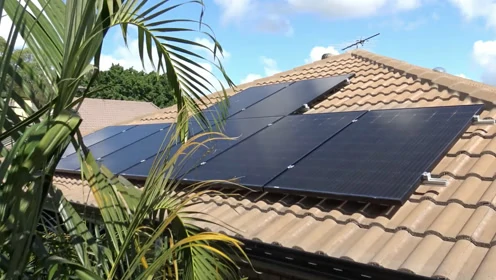Do I need storage batteries for my solar system?
According to the “U.S. Solar Market Insight 2023 Year-in-Review” report released by SEIA and Wood Mackenize, the United States installed 32.4 GW of solar energy in 2023. Perhaps people would not have thought that solar energy systems would become so popular so quickly.
There is no doubt that solar power systems have given us a lot of convenience. Compare your bills and see if it has saved you thousands of dollars? A home that has installed enough solar panels can get electricity to power the entire house without worrying about spending a penny during a sunny day.
But the sky needs rain, and the sun will rest. When night falls, the power of the solar system will decline and can no longer provide any energy. To maintain the necessary appliances, refrigerators, lights or ovens. We still need to pay for the next dozen hours of electricity. And what’s worse is the night when there is a power outage.
Can I do something to make my solar system more reliable? Storage battery eliminate these difficulties and provide you with a reliable energy storage system for cloudy days and nights.
What is a solar energy storage battery?
A solar energy storage battery is a device that converts solar energy into electrical energy and stores it. Its working principle is based on electrochemical reactions, by converting the electrical energy generated by solar panels into chemical energy and storing it in batteries. When solar panels cannot directly provide electrical energy to the load (such as at night or in cloudy weather), the energy storage battery will release the stored energy to ensure a continuous supply of energy.
Is it best to have battery storage for solar panels?
In a survey of respondents who installed solar, 48% of homeowners purchased solar panels along with solar panels. But energy storage batteries are not necessary for solar systems. Batteries can store excess energy generated by solar panels and continue to be used by you at night. Solar energy without batteries can only work for the family during the day, while batteries can make more comprehensive use of solar energy.
The energy source of energy storage batteries must be not only through solar panels. In addition, batteries can be charged from the grid. If your area adopts a peak electricity price policy, you can choose to fully charge the battery at the lowest price time and then release it when needed. Like an enlarged mobile phone power bank.
difference between solar and solar with battery storage
Solar Only
- Operation and Cost Savings:
How It Works: A traditional solar system converts sunlight into electricity using photovoltaic (PV) panels. This electricity is used to power your home.
Cost Savings: Homeowners can benefit from reduced electricity bills and potential net metering credits.
- Limitations:
No Energy at Night: Without sunlight, solar panels do not generate electricity. This means that during the night or on very cloudy days, you will still rely on grid power.
Grid Dependence: During power outages, a solar-only system will not provide electricity as it shuts down to protect utility workers.
Solar with Battery Storage
- Operation and Energy Independence:
How It Works: In addition to PV panels, a solar system with battery storage includes batteries that store excess energy generated during the day. This stored energy can be used at night or during power outages.
Energy Independence: Provides greater energy security by ensuring a continuous power supply even when the grid is down or during peak demand times when electricity rates are higher.
- Benefits:
Backup Power: Battery storage systems offer backup power during outages, ensuring critical appliances and systems remain operational.
Maximized Renewable Energy Use: Stored energy can be used during non-sunny periods, increasing the use of renewable energy and reducing reliance on the grid.
Peak Shaving: By using stored energy during peak demand times, homeowners can avoid high electricity rates, further reducing energy costs.
Key Differences Between Solar and Solar with Battery Storage
The primary distinctions between solar-only systems and those with battery storage lie in cost, energy management, and environmental impact. Solar-only systems are generally cheaper to install as they require fewer components. However, solar systems with battery storage involve a higher initial investment due to the cost of batteries and additional installation, but they offer long-term savings and energy security by providing a more consistent and reliable power supply.
In terms of energy management, solar-only systems directly use solar energy when available and rely on the grid for backup, while solar with battery storage can store excess energy for later use. Environmentally, solar-only systems reduce the carbon footprint by using renewable energy during the day, but those with battery storage further diminish reliance on fossil fuels by allowing the use of solar energy around the clock.
Which Battery is Better for Solar?
Choosing the right battery for a solar energy system is crucial for optimizing performance, reliability, and cost-effectiveness. Several battery types are commonly used in solar applications, each with its advantages and disadvantages. The most popular choices are Lithium Iron Phosphate (LiFePO4) battery and lead-acid batteries, with emerging interest in other technologies such as sodium-ion batteries.
Battery Comparison: LiFePO4, Lead-Acid, and Sodium-Ion Batteries
| Type of Battery | Advantages | Disadvantages |
|---|---|---|
| Lithium Iron Phosphate (LiFePO4) Batteries |
|
|
| Lead-Acid Batteries (Flooded, AGM, Gel) |
|
|
| Sodium-Ion Batteries |
|
|
The choice of battery for a solar system depends on the specific needs and constraints of the user. For long-term investment and minimal maintenance, LiFePO4 batteries are the superior choice. For budget-conscious installations, lead-acid batteries may be appropriate, while sodium-ion batteries could become a strong contender as the technology matures.
Conclusion
Choosing between a traditional solar system and one with battery storage depends on your specific needs and priorities. If you seek lower upfront costs and are comfortable relying on the grid during non-sunny periods, a solar-only system might be sufficient.
However, if you value energy independence, backup power, and maximizing your use of renewable energy, integrating battery storage into your solar system is a worthwhile investment.




